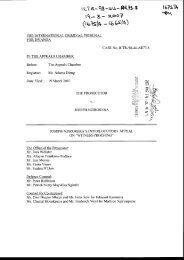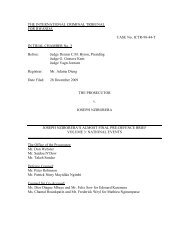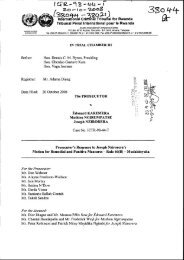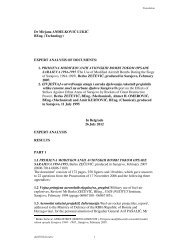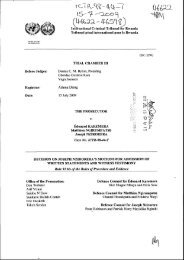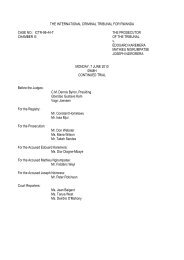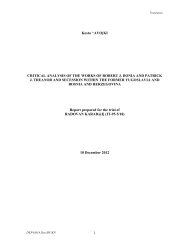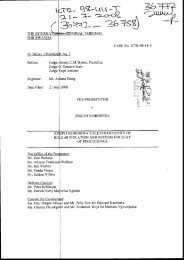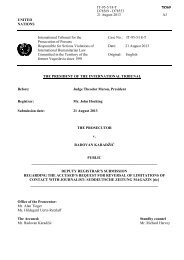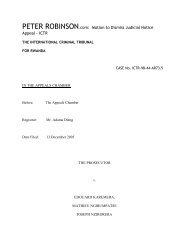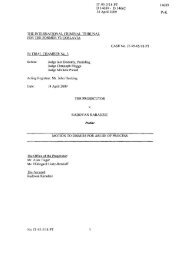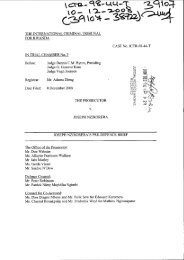Appeal - Peter Robinson
Appeal - Peter Robinson
Appeal - Peter Robinson
- No tags were found...
Create successful ePaper yourself
Turn your PDF publications into a flip-book with our unique Google optimized e-Paper software.
Ana Castellani y Flavia Llanpart. Debates en torno a la calidad de la intervención estatal.Papeles de Trabajo, Año 6, N° 9, junio de 2012, pp. 155-177.procurar desarrollo si los funcionarios se aseguran que los empresarios hagan un usoproductivo de los subsidios que reciben. En tal sentido, la noción de reciprocidad buscadar cuenta de una relación asimétrica en donde las instituciones estatales procuranobtener determinados desempeños a cambio de recursos públicos transferidos directa oindirectamente al capital. Para que exista una situación de reciprocidad es necesario quese cumplan varios pasos: que los funcionarios establezcan normas claras de desempeñopara las empresas, que haya acceso confiable y preciso a la información que les permitaevaluar si los acuerdos establecidos se cumplen o no, que tengan la capacidad deimponer sanciones o castigos a aquellos que se apartan de lo acordado, y que existanmecanismos de control social que permitan evaluar la conducta de los funcionarios paraevitar situaciones de connivencia y/o hechos de corrupción. 8 Esta nueva aproximaciónpone en consideración un componente nodal de la autonomía del Estado: la capacidadde disciplinamiento que puede ejerce sobre el empresariado.Sin embargo, tanto la autonomía enraizada como el disciplinamiento estánorientados a pensar la articulación entre instituciones estatales y empresarios desde unavisión centrada en el Estado. La respuesta a cómo se vinculan empresarios y agentesestatales se responde teniendo en cuenta exclusivamente las características, procesos yredes elaboradas al interior del aparato estatal. Como se verá más adelante, este tipo deinterpretación debe ser conjugada con elementos que permitan abordar el otro extremode la relación: los actores empresarios y sus formas de organización y acción.Por otro lado, la utilidad de estos conceptos en aparatos institucionales que nocuentan con una burocracia weberiana es cuestionable. En ellas las relaciones que seestablecen entre funcionarios y actores económicos socavan la posibilidad de autonomía(Castellani, 2009, cap. I). Por lo tanto, el concepto de enraizamiento muestradificultades de especificación empírica cuando se busca dar cuenta de graduaciones odistintas modalidades. Es útil para catalogar casos extremos en los cuales no sevislumbra ningún tipo de relación entre Estado y empresarios (falta de enraizamiento) o8 Para Schneider la reciprocidad debe ser entendida como uno de los componentes de la autonomíaenraizada. La diferencia se encuentra en que la reciprocidad es una relación unilateral, específica(reciprocidad dada por una política puntual sobre un actor puntual) y a corto plazo; mientras el conceptode autonomía busca dar cuenta de una relación bilateral de intercambio permanente (realimentación entreactores) en el largo plazo. Esta diferencia se debe a que en el caso de Evans es más importante analizarlos canales institucionales formales e informales que dan marco a la relación entre empresas y Estado, yno el análisis especifico del Estado con cierta empresa, grupo o fracción empresaria (Schneider, 1999: 52-56).Papeles de trabajo. Revista electrónica del Instituto de Altos Estudios Sociales de laUniversidad Nacional de General San Martín. ISSN 1851-2577. Año 6, Nº 9, Buenos Aires,junio de 2012. Dossier: “Debates teóricos contemporáneos en Sociología Económica”.161
agilAbelieve that a person may be in contempt of the Tribunal.2e A prosecution can beinitiated by the person directed to conduct the investigation or the Chamber itself.3o Ifsuch a prosecution is initiated, the Rules of Procedure and Evidence apply3l, counsel maybe appointed to representhe accused person32, the punishment is up to 7 yearsimprisonment and a 100,000 Euro fine33, and "any decision rendered by the TrialChamber under this rule shall be subject to appeal.3a24. Therefore, Mr. Nzirorera contends that his appeal of the Trial Chamber'srefusal to initiate an investigation for false testimony of Ahmed Mbonyunkiza,Ilke theappeal of the prosecution in Seselj, is admissible. In the Impugned Decision, the TrialChamber held that sufficient grounds did not exist to initiate false testimony proceedingsagainst Mbonyunkiza,whichin effect dismissed Mr. Nzirorera's request to initiate suchproceedings.25.The <strong>Appeal</strong>s Chamber also considered that "aparty in proceedings before theInternational Tribunal has the right to request the Trial Chamber to exercise itsdiscretionary power to initiate contempt proceedings for alleged conduct that would harmthat party's right to afair fr,a1."35 Likewis e, aparty who is the victim of false testimonyhas the right to request the Trial Chamber to exercise its discretion to investigate falsetestimony. Mr. Nzirorera has repeatedly contended that the Trial Chamber's refusal toinitiate investigations into false testimony has provided prosecution witnesses a license tolie in his case, violating his right to a fair tria1.36" Rule 771c;'o Rule 771D;" Rule 77(E)" Rule 77G')t'Rule 7z1G;'o Rule 771q35 Seselj atpan. 1336Motion for Investigation of Ahmed Mbonyunkiza for False Testimony (29 May 2006) at para. I 8; JosephNzirorera's Motionfor Appointment of Amicus Curiae: Ngirumpatse Letters (2 July 2007) atpara. 18;Joseph Nzirorera's Motion for Investigation of Witness HH for False Testimony (30 July 2007)
2ts(l hGrounds of<strong>Appeal</strong>26.Mr. Nzirorera raises the following grounds of appeal:(A) The Trial Chamber made the same error as the Trial Chamberin Seselj by imposing too high a burden of establishing intent;(B)(c)The Trial Chamber erred in holding that "conflicting testimonydoes not suffice to demonstrate that a contradicted witness hasgiven false testimony."The Trial Chamber erred in imposing sanctions upon defencecounsel for what was. in fact. a meritorious motion.Standard of Review27.The <strong>Appeal</strong>s Chamber in Seselj held that the right to appeal under Rule 77(J)allowed the prosecution to seek review of the Trial Chamber's decision on the groundsthat there was an incorrect application of the legal standard governing such requests.3TTherefore, Mr. Nzirorera contends that the standard of review of an appeal under Rule91(I) is whether the Trial Chamber applied an incorrect legal standard in refusing toinitiate an investigation for false testimony.ArgumentThe Trial Chamber Applied an IncorrectLegal Standard by Requiring a HighBurden of Proof of Intent28.lnthe Seselj decision, the <strong>Appeal</strong>s Chamber held that the Trial Chamberapplied an incorrect legal standard when concluding that the mental element of contempthad not been established, as it would have to be proven that the alleged contemnor hadknowledge of the protected status of the witness. The <strong>Appeal</strong>s Chamber held that the"sufficient grounds" standard of Rule 77(D) requires the Trial Chamber only to establishwhether the evidence before it gives rise to a primafacie case of contempt of the Tribunaland not to make a finding that contempt has been commiffed.3829.T\e Trial Chamber in Mr. Nzirorera's case made the same error as the TrialChamber in Seselj. It held that "contradictory evidence between witress' testimonies is37 Seseli atpara. 1338 Prosecutor v Seselj,No. IT-03-67 -AR77.2, Decision on the Prosecution's <strong>Appeal</strong> Against the TrialChamber's Decision of I0 June 2008 (25 July 2008) atpara.l6
2:tgsl Ainsufficient evidence to demonstrate that a witness intended to mislead the Chamber andto cause harm"3e, and that "conflicting testimony does not suffice to demonstrate that acontradicted witness has given false testimony."4o Had it applied the correct standard, itcould only have concluded that a prima facie case for false testimony had been made outagainst Ahmed Mbonyunkiza.30. The situation before the Trial Charnber in Mr. Nzirorera's case warrantedeven a lower threshold than that in Seselj, since the issue involved only whether tocommence an investigation, rather than the more serious step of initiating contemptproceedings themselves. Therefore, the Trial Chamber erred in requiring a high standardof proof of intent to mislead the Chamber or cause harm.31. The false accusations by Mr. Mbonyunkizathat co-accused and alleged JCEmember Mathieu Ngirumpatse called for the extermination of the Tutsi at MRND partymeetings certainly satisfy the primafacie standard, since they were made at Mr.Ngirumpatse's trial and contain allegations which, if true, go directly to prove the chargein the indictrnent that the three accused were members of a joint criminal enterprise toexterminate the Tutsi.32. Therefore, the <strong>Appeal</strong>s Chamber should find that the Trial Charnber appliedan erroneous legal standard when requiring a high standard of proof of intent to misleadthe Chamber and to cause harm.The Trial Chamber Erred in HoldingThat Contradictory Evidence is notSufficient for an fnvestisation33. Mr. Mbonyunkiza's testimony conceming MRND meetings at which MathieuNgirumpatse called for the extermination of the Tutsi was contradicted by testimony offive of the prosecution's own witnesses, two of whom Mbonyunkiza testified werepresent at that meeting. Since a conviction of Mr. Mbonyunki za for giving falsetestimony could be based upon the uncorroborated testimony of a single witness, ifbelieved beyond a reasonable doubt,ar it is simply not logical to conclude that the3e Decision on Defence Motion for Investigation of Prosecution llitness Ahmed Mbonyunkiza for FalseTestimony (29 December 2006) at para. 7ao Impugrred Decision atpara. 12at ProsecutorvKajelijeli,No.ICTR-98-44A-T,JudgmentandSentence(l December2003)aIpara.4l;Prosecutor v Aknyesu, No. ICTR-96 -4-T , Judgemezt (2 September 1998) at para. 735; Prosecutor vl0
a,rc/A37. Should the <strong>Appeal</strong>s Chamber find that the arguments of Mr. Nzirorera in thisappeal are meritorious, it is only fair that in reversing the decision of the Trial Chamber,it reverse the imposition of sanctions as well. The arguments could hardly be deemedfrivolous if the <strong>Appeal</strong>s Chamber agrees with them.38. While the <strong>Appeal</strong>s Chamber has held that sanctions, in and of themselves,cannot be appealed,a5 its power to make orders ancillary to its decision on the merits canbe exercised to reverse the sanctions imposed in this case. To fail to do so would be tocreate an oxymoron--a meritorious appeal based on a frivolous motion.Conclusion39. The Trial Chamber applied two incorrect legal standards in refusing to orderan investigation into the false testimony of Prosecution Witness Ahmed Mbonyunkiza. Italso erroneously deemed meritorious arguments to be frivolous. The <strong>Appeal</strong>s Chamber isrespectfully requested to reverse the decision of the Trial Chamber in all respects.Word count: 3955o-ro;+t rtty ruu*iupa,t/."/.i*r*'1'l-; .1,7 t*"gi t-)t" t\*va''\-*PI'I.ER s"OBniSONI-ead Counsel fbr Joseph Nzirorerant Nzirorera v Prosecutor,No. ICTR-98-44-AR73(F), Decision on Counsel's Appeatfrom Rute 73(F)Decisions (9 June 2004)T2



